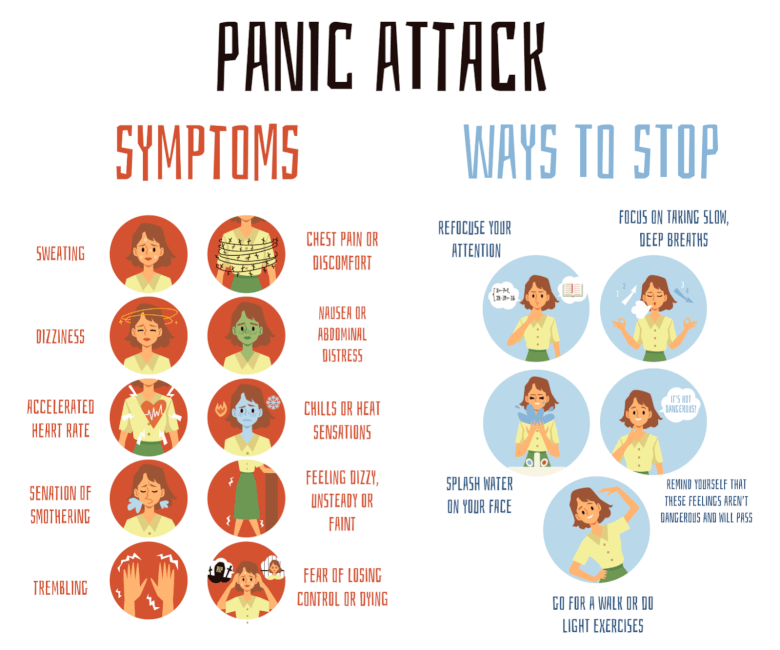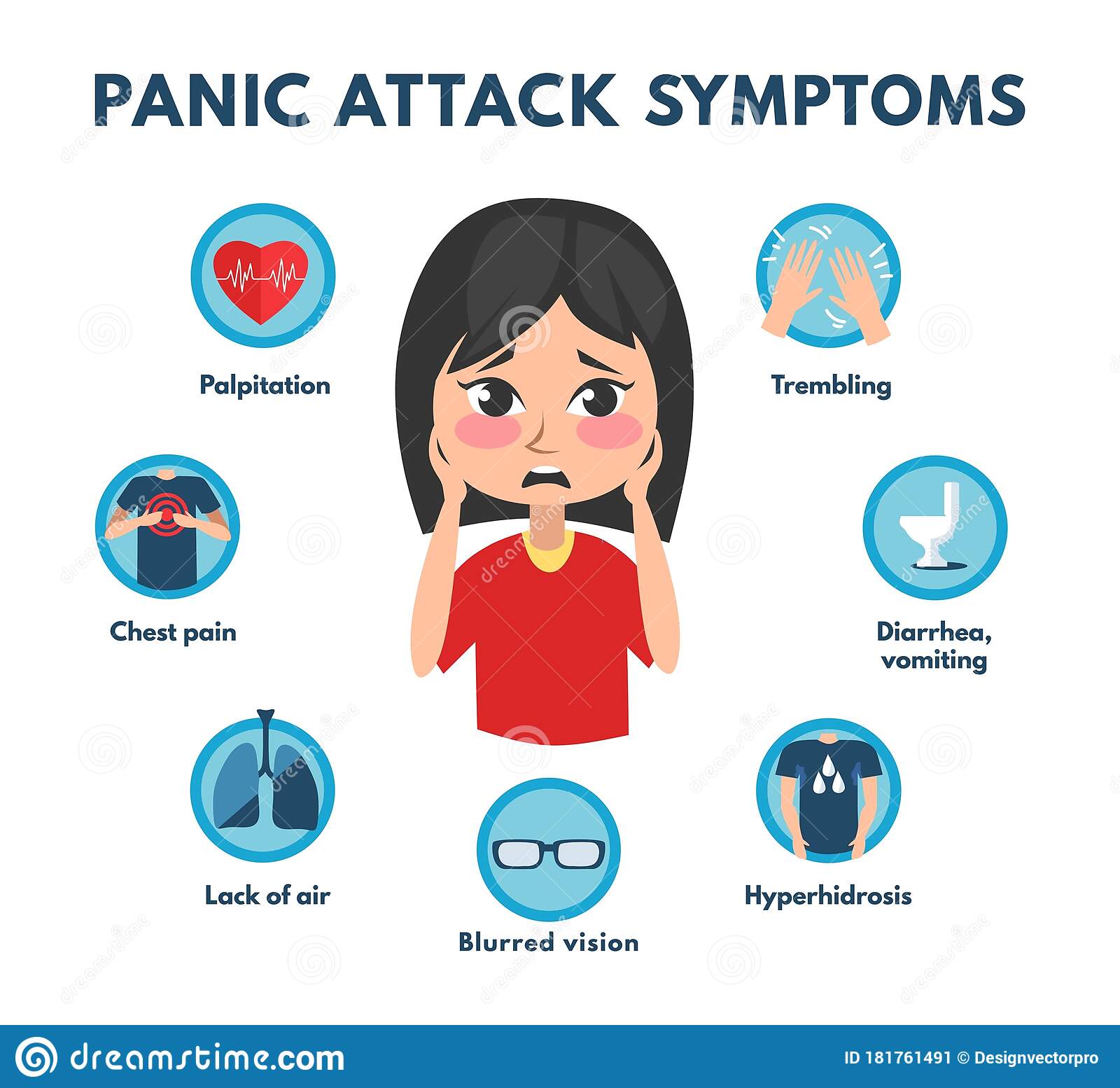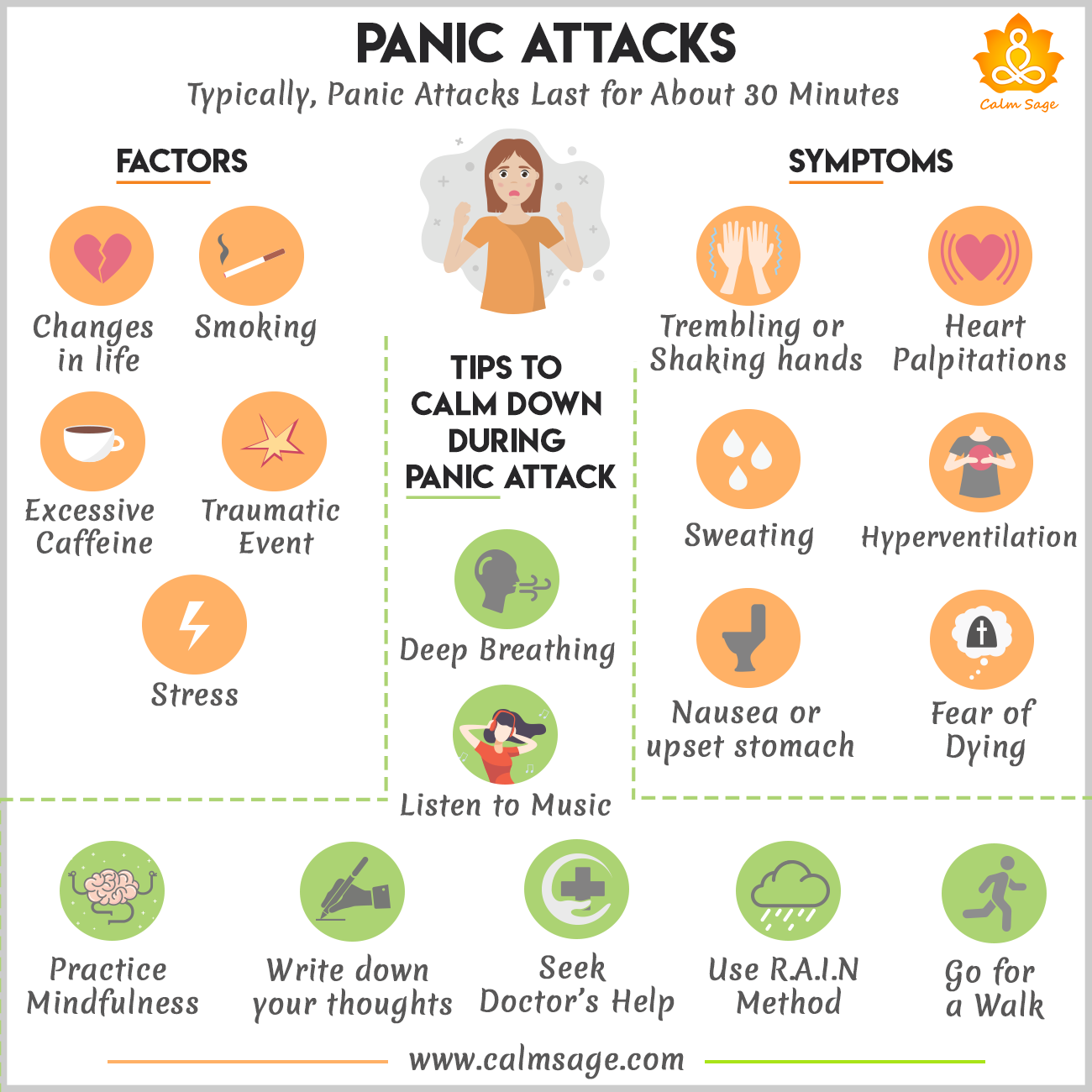Treatment For Panic Attacks And Panic Disorder
The most effective form of professional treatment for tackling panic attacks, panic disorder, and agoraphobia is therapy. Even a short course of treatment can help.
Cognitive behavioral therapy focuses on the thinking patterns and behaviors that are sustaining or triggering your panic attacks and helps you look at your fears in a more realistic light. For example, if you had a panic attack while driving, what is the worst thing that would really happen? While you might have to pull over to the side of the road, you are not likely to crash your car or have a heart attack. Once you learn that nothing truly disastrous is going to happen, the experience of panic becomes less terrifying.
Exposure therapy for panic disorder allows you to experience the physical sensations of panic in a safe and controlled environment, giving you the opportunity to learn healthier ways of coping. You may be asked to hyperventilate, shake your head from side to side, or hold your breath. These different exercises cause sensations similar to the symptoms of panic. With each exposure, you become less afraid of these internal bodily sensations and feel a greater sense of control over your panic.
Symptoms Of Panic Attacks And Panic Disorder
A panic attack involves the sudden appearance of intense fear or discomfort plus at least four of the following physical and emotional symptoms:
-
Chest pain or discomfort
|
Many people with panic disorder also have symptoms of depression.
Symptoms usually peak within 10 minutes and disappear within minutes, leaving little for a doctor to observe except the person’s fear of another terrifying attack. Because panic attacks may occur for no apparent reason, people who have them frequently anticipate and worry about another attackâa condition called anticipatory anxietyâand try to avoid situations that they associate with previous panic attacks.
Because symptoms of a panic attack involve many vital organs, people often worry that they have a dangerous medical problem involving the heart, lungs, or brain. For example, a panic attack can feel like a heart attack. Thus, people may repeatedly visit their family doctor or a hospital emergency department. If the correct diagnosis of panic attack is not made, they may have the additional worry that a serious medical problem has been overlooked. Although panic attacks are uncomfortableâat times extremely soâthey are not dangerous.
The frequency of attacks can vary greatly. Some people have weekly or even daily attacks that occur for months, whereas others have several daily attacks followed by weeks or months without attacks.
How To Stop A Panic Attack
Before wrapping up the article, here are some tips for you to practice if you or your loved one is having panic attacks.
- Practice deep breathing by inhaling through your nose, holding your breath while counting to 5, and finally exhaling through your mouth.
- Use your senses to ground yourself back at the moment. Focus on what you are seeing, touching, or listening to.
- Prepare a list of images you can visualize when having a panic attack.
- Adopt a healthy lifestyle including exercise and a healthy diet.
- Practice muscle relaxation once daily.
Don’t Miss: How To Help Someone With Schizophrenia Hallucinations
What Are The Symptoms Of A Panic Attack And Panic Disorder
A panic attack may cause a feeling of intense fear, terror, or anxiety. Other symptoms include trouble breathing, chest pain or tightness, and a fast or irregular heartbeat.
When you have panic disorder, you have repeated, unexpected panic attacks. And you may worry that you’ll have another attack. Because of this fear, you may change your daily activities to avoid situations that may trigger it.
Don’t Fight A Panic Attack

Fighting a panic attack can often make it worse. Trying to resist the attack and finding you’re unable to can increase your sense of anxiety and panic.
Instead, during a panic attack, reassure yourself by accepting that although it may seem embarrassing, and your symptoms may be difficult to deal with, the attack isn’t life-threatening. Focus on the fact that the attack will evetually end and try your best to let it pass.
Also Check: What To Do When Someone Is Having A Panic Attack
Panic Attacks In Children And Adolescents
Panic attacks often begin during adolescence, although they may start during childhood. Attacks can lead to severe anxiety, as well as affecting other parts of a child’s mood or functioning.
Some children begin to avoid situations where they fear a panic attack may occur. Adolescents might use alcohol or drugs to reduce their anxiety. If not recognized and treated, panic attacks can cause future complications for children such as severe depression and suicidal behaviour.
When diagnosed early on, children experiencing panic attacks usually respond well to treatment.
Should I Be Worried About Having Panic Disorder If Ive Had A Panic Attack
Not necessarily. Panic attacks are relatively common, and only a small number of people develop panic disorder.
Just over one in ten people a year will have a panic attack. While frightening, most are one-off events that arent a cause for serious concern.
Panic disorder affects around 2-3 percent of Americans. Women are more likely to be diagnosed with panic disorder than men.
Resources:
Recommended Reading: What Is Stress And Anxiety
Preventing A Further Attack
It may help to:
- read a self-help book for anxiety based on the principles of cognitive behavioural therapy ask your GP to recommend one
- try complementary therapies such as massage and aromatherapy, or activities like yoga and pilates, to help you relax
- learn breathing techniques to help ease symptoms
- do regular physical exercise to reduce stress and tension
- avoid sugary food and drinks, caffeine and alcohol, and stop smoking, as all they can all make attacks worse
For more help, read how to deal with panic attacks.
What Is Panic Disorder
If you have repeated, and unexpected panic attacks, you may have panic disorder. Panic disorder causes bouts of overwhelming fear when there is no specific cause for the fear. In between panic attacks, you may worry greatly about when and where the next one may happen. It can even keep you from leaving your home.
You May Like: How Do You Stop Anxiety
How Our Helpline Works
For those seeking addiction treatment for themselves or a loved one, the PsychGuides.com helpline is a private and convenient solution.
We are standing by 24/7 to discuss your treatment options. Our representatives work solely for AAC and will discuss whether an AAC facility may be an option for you.
Our helpline is offered at no cost to you and with no obligation to enter into treatment. Neither PsychGuides.com nor AAC receives any commission or other fee that is dependent upon which treatment provider a visitor may ultimately choose.
For more information on AACs commitment to ethical marketing and treatment practices, or to learn more about how to select a treatment provider, visit our About AAC page.
If you wish to explore additional treatment options or connect with a specific rehab center, you can browse top-rated listings or visit SAMHSA.
Complications Of Panic Disorder
Panic disorder is treatable and you can make a full recovery. But it’s best to get medical help as soon as you can.
If you do not get medical help, panic disorder can escalate and become very difficult to cope with.
You’re more at risk of developing other mental health conditions, such as agoraphobia or other phobias, or an alcohol or drug problem.
Having panic disorder may affect your ability to drive. The law requires you to inform the Driver and Vehicle Licensing Agency about a medical condition that could impact your driving ability.
Visit GOV.UK for further information about driving with a disability or health condition.
You May Like: What Are The Different Types Of Depression
What Do Panic Attacks Feel Like
During a panic attack, physical symptoms can build up very quickly. These can include:
- a pounding or racing heartbeat
- feeling faint, dizzy or light-headed
- feeling very hot or very cold
- sweating, trembling or shaking
- pain in your chest or abdomen
- struggling to breathe or feeling like you’re choking
- feeling like your legs are shaky or are turning to jelly
- feeling disconnected from your mind, body or surroundings, which are types of .
During a panic attack you might feel very afraid that you’re:
During A Panic Or Anxiety Attack

The following strategies can help during an attack:
- Acknowledgment: The symptoms of a panic or anxiety attack can be extremely frightening. Acknowledging the situation and remembering that symptoms will soon pass can reduce anxiety and fear.
- Breathing techniques: Difficulty breathing is among the most common and alarming symptoms of these attacks. Learning techniques to control breathing can help during an attack.
- Relaxation techniques: Methods of relaxation, such as progressive muscle relaxation and guided imagery, can reduce feelings of panic and anxiety.
- Mindfulness: Mindfulness helps people stay grounded in the present moment. It can be especially beneficial for people with anxiety, who tend to worry about perceived and potential stressors.
Medical professionals will assess a persons symptoms and plan treatment accordingly. This will typically center on therapy, medication, or a combination of the two.
Recommended Reading: Can Anxiety Cause Stomach Issues
Are There Clinical Trials Studying Panic Disorder
NIMH supports a wide range of research, including clinical trials that look at new ways to prevent, detect, or treat diseases and conditionsincluding panic disorder. Although individuals may benefit from being part of a clinical trial, participants should be aware that the primary purpose of a clinical trial is to gain new scientific knowledge so that others may be better helped in the future.
Researchers at NIMH and around the country conduct clinical trials with patients and healthy volunteers. Talk to a health care provider about clinical trials, their benefits and risks, and whether one is right for you. For more information, visit NIMH’s clinical trials webpage.
When Might I Have Panic Attacks
Panic attacks happen at different times for everyone. Some people have one panic attack then don’t ever experience another, or you might find that you have them regularly, or several in a short space of time. You might notice that particular places, situations or activities seem to trigger panic attacks. For example, they might happen before a stressful appointment.
Most panic attacks last between 5 to 20 minutes. They can come on very quickly. Your symptoms will usually be at their worst within 10 minutes. You might also experience symptoms of a panic attack over a longer period of time. This could be because you’re having a second panic attack, or you’re experiencing other .
“My panic attacks seem to come out of the blue now. But in fact, they seem to be triggered mainly at night when I want to go to sleep but cannot stop my mind racing, experiencing worry and panic about anything that may be on my mind.”
Don’t Miss: What Is The Phobia Of Clowns Called
Causes Of Panic Disorder
The causes of panic disorder are not well understood, but there are some known links, including
- Other mental health problems. You are more like to have panic disorder if you have, for example, anxiety or depression.
- Family history. Panic disorder appears to run in families, but we dont yet know whether this is because of genetics or because people who live in the same environment are often exposed to the same difficult circumstances.
- Traumatic events in either childhood or adulthood.
- Excessive consumption of alcohol, tobacco, caffeine or illicit drugs.
Should You Seek Medical Attention For Your Symptoms
Any time youre having chest pain and shortness of breath, its a good idea to get it checked out. A routine heart exam might include performing an EKG and blood tests to check for cardiac enzymes and can rule out a heart problem.
Well usually use anxiety as a diagnosis of exclusion once weve ruled everything else out, Dr. Flaherty says. Well find out that theres nothing going on from a cardiology perspective.” That, then, points to panic attacks.
Establishing a relationship with a primary care physician is also vital for your overall health, Dr. Klein says. And if you have anxiety and stress and experience panic attacks, see a mental health professional.
You have to take care of both things, he says. We can take care of the body side, but you have to also take care of the mental side. It’s just as important to improve your quality of life and improve your longevity.
Don’t Miss: Where To Get Help For Ptsd
Anxiety Vs Panic Attack: What Is An Anxiety Attack
Panic Attack vs Anxiety Attack: Anxiety attacks are not listed in the Diagnostic and Statistical Manual of Mental Diseases, Fifth Edition , but anxiety is listed as a symptom of several prevalent psychiatric disorders.
This covers the following circumstances:
- Generalized anxiety disorder
- Obsessive-compulsive disorder
- Specific phobia
Anxiety is frequently linked to the expectation of a difficult circumstance, encounter, or occurrence. It could develop gradually.
Anxiety symptoms include:
The lack of diagnostic recognition of anxiety attacks means that the signs and symptoms are open to interpretation. That is, a person may describe having an anxiety attack and have symptoms that another person has never experienced despite indicating that they, too, have had an anxiety attack.
How Can I Prevent Panic Attacks
Your healthcare provider can help you identify triggers that bring on panic attacks. During psychotherapy, you learn strategies to manage triggering events and prevent an attack. You can also take these actions to lower your odds of having a panic attack:
- Cut back on caffeine.
- Talk to your doctor before taking herbal supplements or over-the-counter medications. Certain substances can increase anxiety.
Don’t Miss: What Medication Is Used To Treat Schizophrenia
Panic Disorder With Impairment Among Adults
- Of adults with panic disorder in the past year, degree of impairment ranged from mild to serious, as shown in Figure 2. Impairment was determined by scores on the Sheehan Disability Scale.3
- Impairment was distributed evenly among adults with panic disorder. An estimated 44.8% had serious impairment, 29.5% had moderate impairment, and 25.7% had mild impairment.
Figure 2
| Severity |
|---|
| 100 |
Talking To A Health Care Provider About Your Mental Health

Communicating well with a health care provider can improve your care and help you both make good choices about your health. Find tips to help prepare for and get the most out of your visit at Taking Control of Your Mental Health: Tips for Talking With Your Health Care Provider. For additional resources, including questions to ask a provider, visit the Agency for Healthcare Research and Quality website.
If you or someone you know is in immediate distress or is thinking about hurting themselves,call the National Suicide Prevention Lifeline toll-free at 1-800-273-TALK . You also can text the Crisis Text Line or use the Lifeline Chat on the National Suicide Prevention Lifeline website.
Read Also: How To Get Out Of Depression
Diagnosing Panic Disorder In Dsm
The diagnostic criteria for panic disorder are defined in the DSM-5. It is an anxiety disorder based primarily on the occurrence of panic attacks, which are recurrent and often unexpected.
In addition, at least one panic attack is followed by one month or more of the person fearing that they will have more attacks and causing them to change their behavior, which often includes avoiding situations that might induce an attack.
It’s important to note that a panic disorder diagnosis must rule out other potential causes for the panic attack :
- The attacks must not be due to the direct physiological effects of a substance or a general medical condition.
- The attacks must not be better accounted for by another mental disorder. These may include a social phobia or another specific phobia, obsessive-compulsive disorder , post-traumatic stress disorder , or .
Etiology / Causes And Risk Factors Of Panic Disorder
Panic disorder is thought to have a psychobiological conceptualization . This does not mean that panic attacks are due to a biological disease. What this does mean is that there are certain biological factors that may be inherited or passed on through genes, and thus may lead some people to be more likely than others to experience panic disorder symptoms. This is likely why panic disorder seems to run in families. In other words, if one family member has panic disorder, the other family members are more likely to experience panic symptoms or panic disorder compared to people without a family history of panic disorder. It is very important to note that just inheriting these vulnerabilities to panic does not make the onset of panic attacks inevitable or unalterable. In fact, it is possible to think and act in ways that prevent panic attacks.
Don’t Miss: How Long Can A Panic Attack Last
Some People May Develop Panic Disorders
For many people, the feelings of panic occur only occasionally during periods of stress or illness. A person who experiences recurring panic attacks is said to have panic disorder, which is a type of anxiety disorder. They generally have recurring and unexpected panic attacks and persistent fears of repeated attacks.